
Before you become a Certified Financial Planner (CFP), you must have the requisite education and go through a strict and rigorous certification process. Apart from the usual educational requirements, an aspiring CFP must have the relevant knowledge, skills, work experience, and ethics. The same applies to the Qualified Associate Financial Planner (QAFP) designation.
In this article, Wealth Professional Canada will provide you with lists of post-secondary programs that meet some of the requirements for Certified Financial Planner certification. We'll also talk about the CFP and QAFP designations.
Your choice of certified financial planning courses depends on whether you wish to pursue a Certified Financial Planner (CFP) or a Qualified Associate Financial Planner (QAFP) role:
If you are planning to pursue a post-secondary degree or diploma, the programs below are some that satisfy the requirements of FP Canada for CFP certification. Refer to this list of programs for becoming a CFP in the country.
If you live or plan to work in Alberta, here’s a list of courses that you can take:
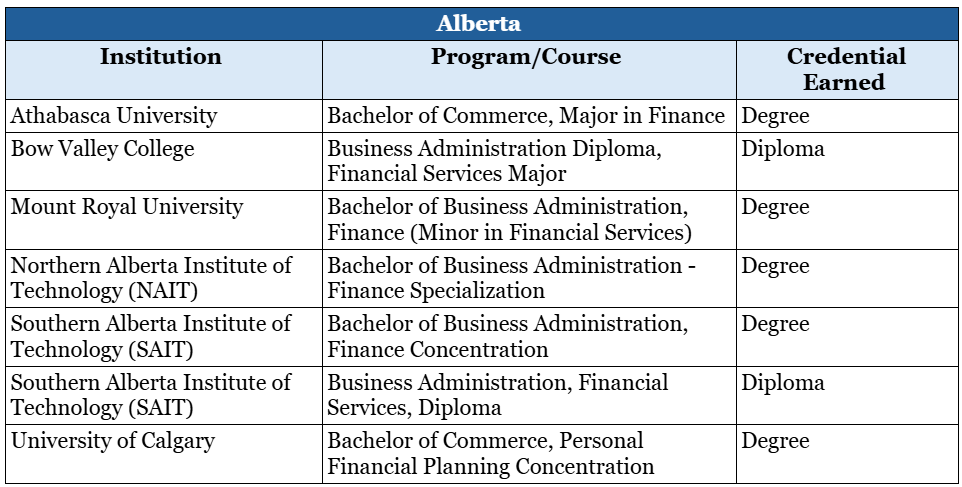
The CFP designation can also be within reach if you take any of these courses in Ontario:
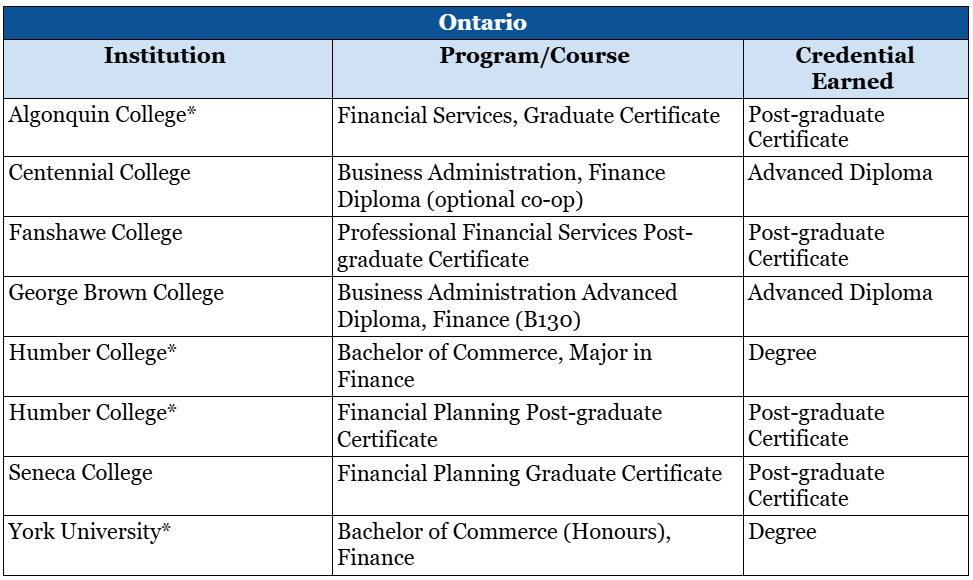
Note from FP Canada: *CFP Certification requires a combination of technical education (Fundamentals and Advanced curriculum) and professional education. Algonquin College, Humber College and York University also offer courses that meet the professional education requirement for CFP Certification.
British Columbia also offers these courses for aspiring CFPs:
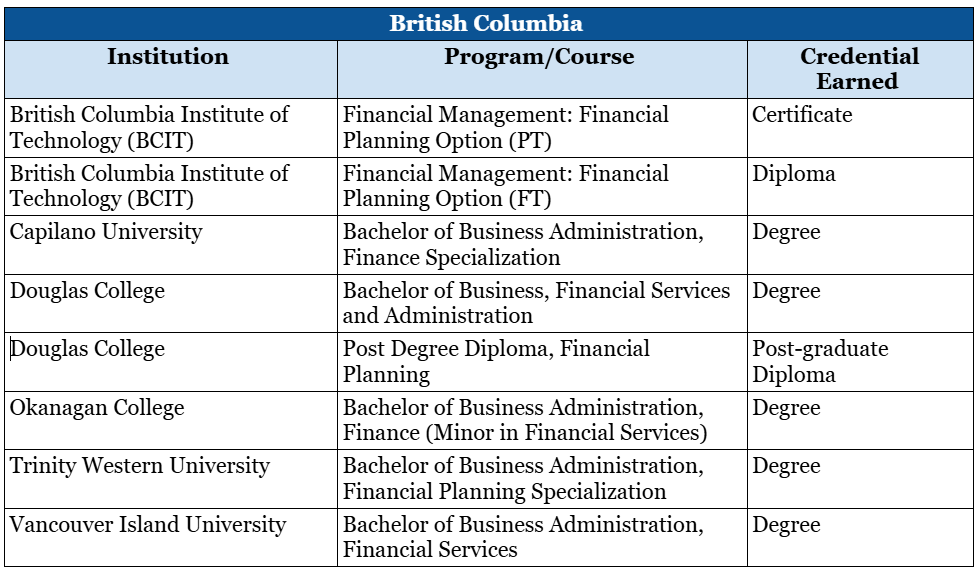
The courses at institutions listed below are some that satisfy the technical education requirements of FP Canada for QAFP certification.
Let’s look at the programs that you can take in Alberta:
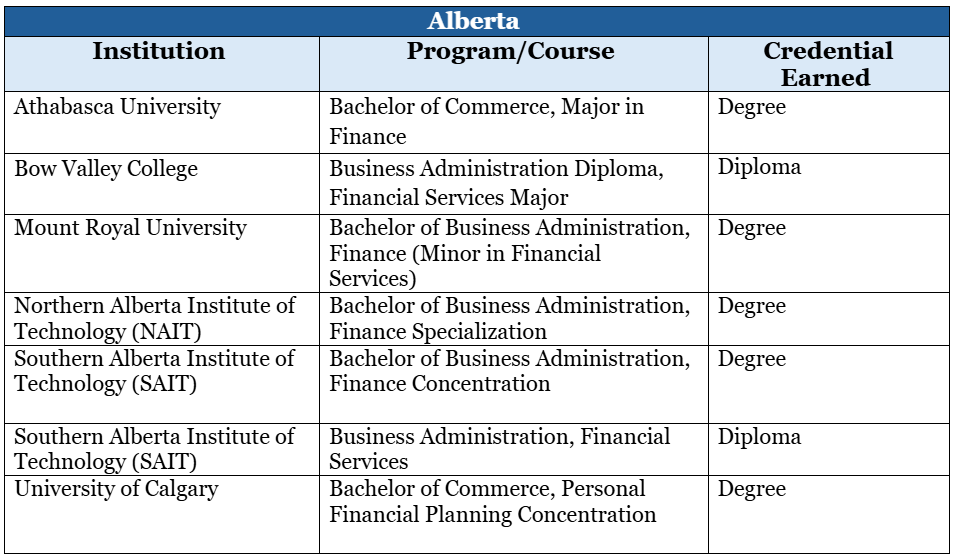
You can also take programs for QAFP in Ontario:
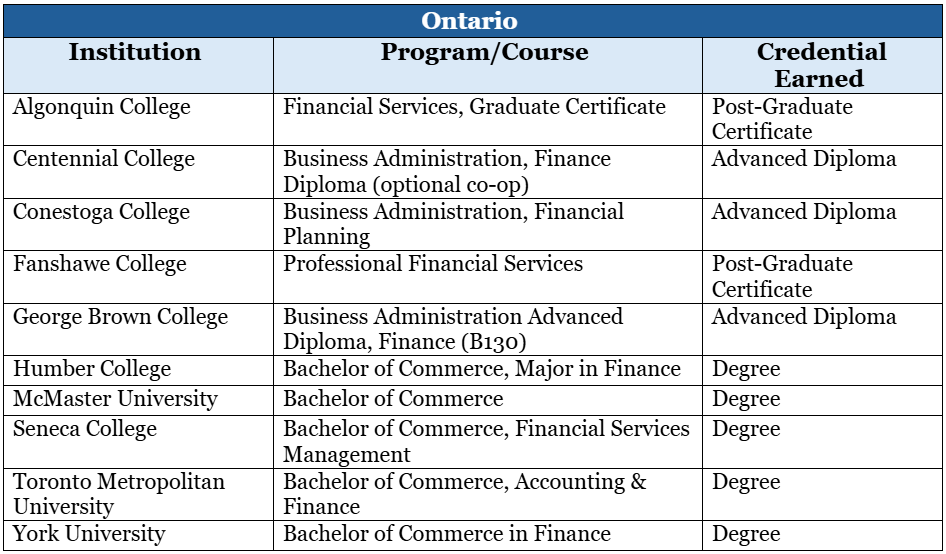
Want to get a QAFP designation in British Columbia? Check out some of the courses you can take in this province:
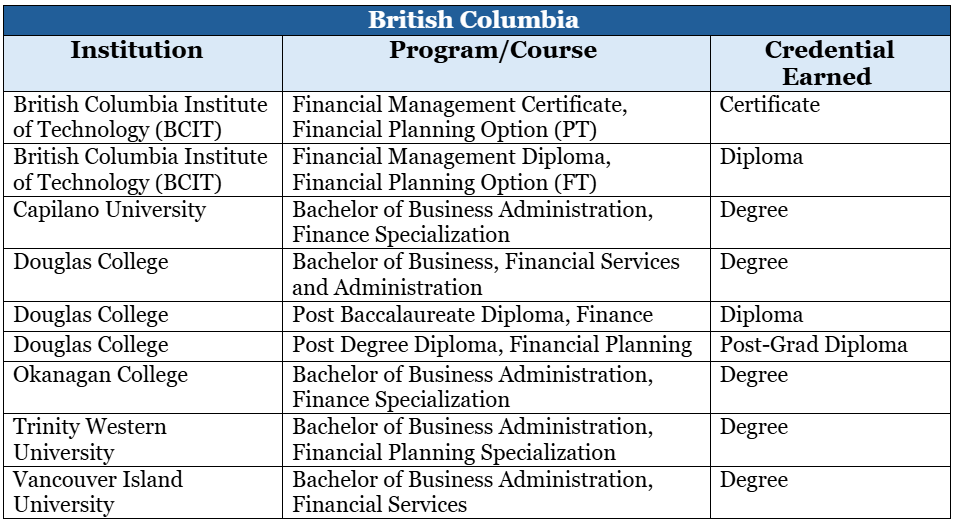
A CFP in Canada is a credentialed professional with demonstrated expertise in these areas:
To earn the designation, candidates must:
hold a minimum three-year, post-secondary degree or an international equivalent, or have ten years of qualifying work experience
complete FP Canada-approved education
pass the CFP exam administered by FP Canada
get three years of qualifying financial planning experience
adhere to the FP Canada Standards Council Standards of Professional Responsibility
complete annual continuing education to renew the designation
CFP certification in Canada is awarded and regulated by FP Canada, formerly the Financial Planning Standards Council, under oversight from the Financial Planning Standards Board.
To better understand the steps on how to get a CFP designation, you can refer to our comprehensive guide.
For this certification, you must complete FP Canada Institute’s Technical Education - Fundamentals and Advanced or a Fundamentals and Advanced program recognized by FP Canada. After that, you can finish the FP Canada Institute CFP Professional Education Program.
The Certified Financial Planner certification is the most widely recognized financial planning designation in Canada. Not only is it recognized globally, but it is also considered the gold standard for the financial planning profession.
Finance professionals with this designation have demonstrated the knowledge, skills, experience and ethics to examine their clients’ complex financial picture in its entirety. CFPs are expected to work with their clients to build the most suitable financial plan.
Mastering the Fundamentals and Advanced curriculum plus the CFP Professional Education Program gives CFP aspirants the required understanding of essential financial planning concepts.
The CFP certification will prepare you to examine your clients’ financial circumstances thoroughly and at the highest possible level of complexity.
To earn QAFP certification, you must complete the FP Canada Institute Technical Education - Fundamentals or a Fundamentals program recognized by FP Canada. Then, proceed to finish the FP Canada Institute QAFP Professional Education Program.
After completing the educational requirement, you need to pass a three-hour, computer-based exam with both stand-alone and case-based multiple-choice questions. The exam covers different areas of financial planning based on the FP Canada Competency Profile.
Next, you need one year of relevant work experience in financial planning. This shows that you can apply what you’ve learned in real-life situations. You must also agree to follow FP Canada’s Standards of Professional Responsibility, which outline ethical and professional conduct.
Before applying for QAFP certification, make sure that you are a holder of a two-year diploma from a recognized Canadian school or its equivalent from another country.
An alternative is to have five years of qualifying work experience if you don’t have a diploma.
After completing your chosen financial planning course and the succeeding steps, you can look forward to a variety of jobs or career pathways. Here are a few options for the intrepid wealth professional aside from the CFP and QAFP designations:
|
Designation
|
Required or relevant courses |
|---|---|
|
Wealth management, investment strategies, international finance, risk management |
|
|
advanced financial planning, investment management, ethics, compliance |
|
|
personal finance, budgeting, financial goal setting, debt management |
|
|
Chartered General Accountant (CGA) |
accounting principles, financial reporting, auditing, taxation, business law |
|
Certified Management Accountant (CMA) |
management accounting, financial analysis, strategic planning, performance mgmt. |
|
Chartered Accountant (CA) |
accounting standards, financial reporting, taxation, auditing, business ethics |
|
investment analysis, portfolio management, ethics, economics |
|
|
financial planning, retirement planning, estate planning, risk management |
|
|
investment management, portfolio construction, asset allocation, financial markets |
|
|
life insurance products, estate planning, risk management, ethics |
|
|
comprehensive financial planning, tax planning, retirement planning, estate planning |
|
|
trust law, estate planning, tax implications, fiduciary responsibilities |
Let’s discuss these career opportunities further below:
These wealth managers specialize in managing international wealth and providing comprehensive financial planning services to high-net-worth individuals and families that have global assets.
FCSI designation is awarded to experienced financial services professionals with a high level of expertise in various areas of finance, particularly in:
These professionals offer personalized financial planning advice and solutions to individuals and families. They help clients manage their finances effectively and achieve financial security.
CGAs specialize in accounting and financial management, providing their expertise in financial reporting, budgeting, and strategic financial planning for organizations.
CMAs do management accounting, focusing on financial analysis, cost management, and strategic decision-making. They focus on helping organizations improve their financial performance. That's why taking certified financial planning courses is critical.
These are highly qualified accountants who provide a wide range of accounting and financial services, including auditing, tax planning, and financial reporting. They can offer their services to both individuals and businesses.
CFAs specialize in investment management and financial analysis, conducting in-depth research on financial markets and securities. They make informed investment decisions for clients.
This type of CFP focuses on providing comprehensive financial planning services, including insurance planning, retirement planning, and estate planning. Their services are meant to help clients achieve their financial goals.
CIM professionals specialize in investment management, designing and implementing investment strategies to help clients grow and protect their wealth over the long term.
A CLU’s forte lies in life insurance planning. Their job is to help clients protect their assets and provide financial security for their loved ones through customized life insurance solutions.
RFPs focus on assisting clients to achieve their financial goals. They provide personalized financial planning advice and solutions to individuals and families. Completing the necessary financial planning courses is key to succeeding in this role.
These finance professionals specialize in estate planning and trust administration. They help clients and their families plan for the transfer of assets and wealth to their heirs in a tax-efficient manner.
If you’re undecided about getting certification as a CFP, it helps to know if you are the type of person who’s right for the profession. Want to know more about the CFP profession? Check out this clip to help you decide if this career is for you:
The path to CFP designation is not an easy one, but it can be well worth its pursuit. There are myriad career opportunities and many success stories about top wealth advisors who chose to get CFP designation.
Helping individuals, families, companies, or organizations achieve their financial goals while doing it in an ethical manner can be very rewarding. It also helps that you can make a decent living doing it and continually expand your financial knowledge and skills.
Read next: What is the fee for a financial planner?
If you like this guide, feel free to check out and bookmark our Investor Resources page for similar articles!
Planning to take the Canadian securities course? Check out these expert prep tips to help you get ready, study smarter, and pass the exam
Curious to find out how much do fees-for-service financial planners charge across Canada? Get a city-by-city breakdown to better guide your clients
York University study finds that the first job is the key step and key barrier to a career in planning
Wondering if the LLQP course is essential to your career as a financial planner? Check out this guide to find out how it can push your career to the next level
The Chartered Investment Manager is an impressive designation that finance professionals can get to boost their expertise and careers. Is this title for you?
Finance professionals wishing to advance their careers may ask, is the path of Certified International Wealth Manager (CIWM) worth the effort? Find out here
Becoming a Fellow of CSI (FCSI) is no easy task. Is it worth the effort of obtaining this designation? Find out more here
Canadians aspiring to be Certified Financial Planners now have the option to take core courses online
Advisor Laura Thompson tells WP about leaving a big bank to join the family firm
The financial planning industry reaches out to a more diverse field